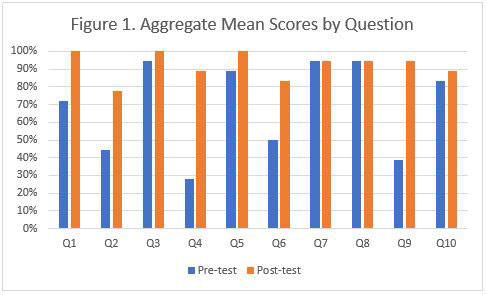Session Information
Session Type: Poster Session A
Session Time: 1:00PM-3:00PM
Background/Purpose: Physical presence of both patients and learners in clinic settings have been reduced during the coronavirus (SARS-CoV-2) pandemic. Learners and teachers alike have had to utilize virtual learning to supplement some of the lost opportunities for in-person teaching and patient encounters.
At our academic medical center, a collaborative multi-specialty effort has led to creation of self-study modules for use by trainees during their rheumatology rotation or beyond. Monoarthritis has been chosen as one particularly high-yield topic for which a learning module was created. The goal of this study was to assess whether our monoarthritis module would increase understanding of high-yield Rheumatology topics among medical students and internal medicine residents. If improvement is seen, this module could be published virtually and used by trainees in both our and other academic medical centers.
Methods: The study was conducted at Virginia Commonwealth University Health System. We developed a PowerPoint module for independent study designed to require approximately twenty minutes to review. Within the module are links to pre- and post-tests containing the same ten multiple-choice questions developed by the authors regarding evaluation and management of monoarthritis. Answers to these questions were not revealed to learners until after completing the post-test. Internal medicine residents and medical students rotating in Rheumatology were asked to complete the pre-test, review the module, then complete the post-test. Data was collected and stored on secure software, then analyzed using two-tailed paired student’s t-test.
Results: Eighteen trainees completed both the pre-test and post-test. Thirteen were internal medicine residents and five were medical students. Mean scores for pre-test and post-test by question are shown below (Figure 1). Aggregate pre-test mean was 68.9% correct (SD = 26.1%) and post-test mean was 92.2% correct (SD = 7.5%), with an absolute mean improvement of 23.3% (p-value = 0.002). Pre-test scores were not significantly different between residents and students.
Conclusion: Our data suggests an improvement in trainee knowledge regarding monoarthritis after completing this module, among medical students and residents alike. Virtual high-yield modules allow for flexible independent learning to augment a multifaceted approach to complex subjects. We plan to include this module as part of a comprehensive virtual Rheumatology curriculum that is still being developed. We hope this curriculum can help demystify the field of Rheumatology for medical students and improve both In-Training Examination (ITE) and board exam scores for internal medicine residents.
To cite this abstract in AMA style:
Dombrosky E, Danielides S, Nandan A, Rubinstein B. Monoarthritis Virtual Teaching Module for Rheumatology Learners [abstract]. Arthritis Rheumatol. 2022; 74 (suppl 9). https://acrabstracts.org/abstract/monoarthritis-virtual-teaching-module-for-rheumatology-learners/. Accessed .« Back to ACR Convergence 2022
ACR Meeting Abstracts - https://acrabstracts.org/abstract/monoarthritis-virtual-teaching-module-for-rheumatology-learners/

